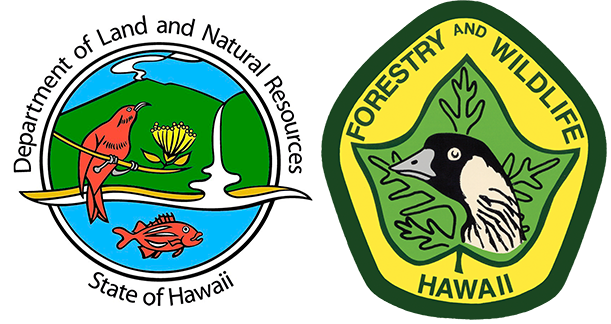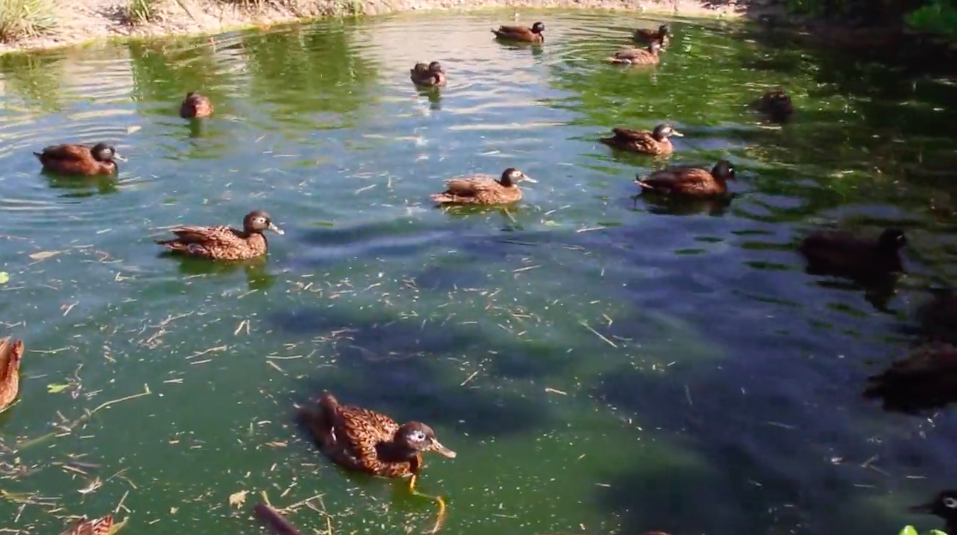Translocation Of Endangered Laysan Ducks To Kure Atoll Showing Tremendous Success
Posted on May 12, 2015DEPARTMENT OF LAND AND NATURAL RESOURCES
News Release
| DAVID Y. IGE GOVERNOR |
SUZANNE D. CASE
CHAIRPERSON |
For Immediate News Release May 12, 2015
(Click on image to watch video)
TRANSLOCATION OF ENDANGERED LAYSAN DUCKS
TO KURE ATOLL SHOWING TREMENDOUS SUCCESS
19 New Downy Ducklings Spotted
Honolulu – The translocation of endangered Laysan ducks (Anas laysanensis) to the remote Kure Atoll State Wildlife Sanctuary in Papahānaumokuākea Marine National Monument appears to be a success. Staff from the State of Hawaii, DLNR Division of Forestry and Wildlife (DOFAW) report that 19 new downy ducklings emerged over the past week.
Successful breeding is a crucial milestone for population establishment at Kure Atoll. Laysan ducks once occurred across the entire Hawaiian Archipelago, but became restricted to Laysan Island, also in the Northwestern Hawaiian Islands, for about 150 years. The island ducks were successfully reintroduced to Midway Atoll National Wildlife Refuge in 2004. Last September, 28 young wild birds were brought from Midway to Kure by ship, and released.
Kure Atoll State Wildlife Sanctuary Manager Cynthia Vanderlip said, “We documented that all 28 founder birds translocated to Kure in the fall of 2014 had survived six months after their translocation and release. Everyone working on this project to help save an endangered species is thrilled that this reintroduction may reduce extinction risk of this rare Hawaiian endemic duck. We all feel like proud parents.”
The translocation project was a joint effort by DLNR/DOFAW, the U.S. Fish and Wildlife Service (USFWS) National Wildlife Refuge System, the U.S. Geological Survey (USGS), Hawaii Wildlife Center, Kure Atoll Conservancy and Papahānaumokuākea Marine National Monument, which is co-managed by the National Oceanographic & Atmospheric Administration (NOAA), USFWS, and the State of Hawaii (DLNR). Transportation of the Laysan ducks, equipment and biologists between the remote islands was aided by the U.S. Coast Guard.
To prepare Kure Atoll for the ducks, DLNR field staff replaced weeds with planted native plants and removed invasive species such as predatory rats and ants, created wetlands and restored native habitat.
The endangered Laysan duck is the rarest duck in the Northern hemisphere and has the smallest geographic range of any duck species in the world. “Laysan ducks do not fly between Atolls, so each additional island reintroduction helps to restore its distribution and the biodiversity of Hawaii,” explained Dr. Michelle Reynolds of the USGS.
Laysan ducks once lived on the main Hawaiian Islands, but disappeared about 800 years ago with the arrival of invasive rats. Non-native rabbits were purposely introduced to Laysan and Lisianski Islands beginning in the late 1800s which resulted in the near extinction of Laysan ducks in the Northwestern Hawaiian Islands and led to the extinction of three endemic land birds (Laysan rail [Porsana palmeri], Laysan honeycreeper [Mimatione sanguinea freethii], and Laysan millerbird [Acrocephalus familiaris familiaris]) at Laysan Island.
In 1911, the Laysan duck population was recorded as less than 20 birds. With rabbit and rat eradication, habitat restoration and translocation efforts, the population approached nearly 1,000 birds by 2010 on Laysan and Midway. The Japan tsunami in 2011 caused a 40% decrease in the population. The species continues to be threatened by avian disease, severe storms, and sea level rise. Laysan ducks typically have long term pair bonds. Only the females care for the ducklings. Families (broods) range in size from 2-10 ducklings. The Laysan ducks are mostly nocturnal and insectivorous.
# # #
Photographs of Laysan ducks at Kure Atoll State Wildlife Sanctuary and Midway Atoll National Wildlife Refuge:
https://www.dropbox.com/sh/62iangcugisnxiw/AAB_twUAZSauYuxTSP0UPsXqa?dl=0
(Photographs courtesy: DLNR)
Papahānaumokuākea is cooperatively managed to ensure ecological integrity and achieve strong, long-term protection and perpetuation of Northwestern Hawaiian Island ecosystems, Native Hawaiian culture, and heritage resources for current and future generations. Three co-trustees – the Department of Commerce, Department of the Interior, and State of Hawai‘i – joined by the Office of Hawaiian Affairs, protect this special place. Papahānaumokuākea Marine National Monument was inscribed as the first mixed (natural and cultural) UNESCO World Heritage Site in the United States in July 2010. For more information, please visit www.papahanaumokuakea.gov.
Dan Dennison
Senior Communications Manager
Office of the Chair
Hawaii Department of Land & Natural Resources
1151 Punchbowl Street, Room 130
Honolulu, Hawaii 96813
Tel 808-587-0407
Cell 808-295-8749
Fax 808-587-0390
[email protected]

